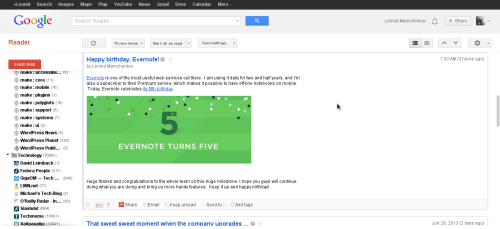Today, June 30th, is the last day of Google Reader availability. If you completely ignored all the noise around the matter, run quickly, export and backup your feeds. Tomorrow Google Reader will be no more.
Of course, I’ve been on a quest for the Google Reader alternative. Of course, I found plenty. And, of course, none of them are exactly the same. I’ve decided to stick with Bazqux, and I’ve paid my yearly subscription fee a few month ago.
It’s also worth mentioning that a lot of work went into many of the alternatives over the last months, as more and more people started looking for the new RSS home. Some of that work was quite noticeable. For example, Feedly changed in the last 100 days so much that I had to re-evaluate it completely. And, also, new services were introduced – such as Digg Reader.
Still, with all that, it’s sad to see Google Reader go. I’ve used it every single day and relied heavily on it for years. Paraphrasing the classic quote: so long, and thanks for all the feeds.

